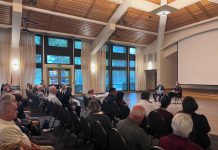One night in a busy hospital a small boy was brought in, dying
from a road accident. All too soon he was declared brain dead. A
transplant coordinator was there and did what she was required to
do: She asked the distraught parents if they would donate his
organs. It must be one of the most searing duties in medicine.
By Reg Green
One night in a busy hospital a small boy was brought in, dying from a road accident. All too soon he was declared brain dead.
A transplant coordinator was there and did what she was required to do: She asked the distraught parents if they would donate his organs. It must be one of the most searing duties in medicine.
The parent’s answer was an angry refusal at what they saw as a crass intrusion into their grief. The nurse said she understood, their world had collapsed.
But all she could think of was that, on the third floor of that same hospital, another mother and father were sitting by the bedside of their own little boy, who was also dying that night, and did die, because the new heart he needed never arrived.
I often think of that family and how close they came to being saved and how, in all probability, they would have been saved, if only those other parents had spared a few moments, months before, to talk about organ donation while death was just a distant concept.
It is this kind of situation that the Donate Life California Registry is designed to deal with. Under a new state law that goes into effect Monday, those who want to donate their body parts have, for the first time, a simple and unambiguous way of making their wishes known.
Until now, Californians have signed donor cards or placed the familiar pink dot on their driver’s license. That is a big step, a clear declaration of intent. But it has a severe limitation.
Those names have never been recorded in any central registry. In the shock of death, many people have no idea where the wallet or purse with the license in it is, and few want to go searching for it.
In families who have had some sort of discussion, however brief, the choice is generally much clearer; but even then, memories are hazy and at a time of stress even one uncertain member can put doubt in everyone’s mind.
All this is why, although the great majority of Americans say they are in favor of organ donation, only around 50 percent of families faced with the choice go through with it and why, as a result, every day 17 people die on the waiting list, many of them children, some just babies.
Registering online is simple and free. You enter a few personal details at www.donateLIFEcalifornia.org or, for Spanish speakers, www.doneVIDAcalifornia.org .
These are the websites of the Donate Life California Registry, which is administered by the four non-profit organ procurement organizations chosen by the federal government to facilitate organ and tissue donation in California. Your decision, which is confidential, is legally binding and does not require the consent of anyone else. If you change your mind later you can remove your name.
One person can save up to eight lives. In addition, tissue – including corneas to prevent blindness, skin to cure painful burns and bone to avoid amputations – can relieve suffering for up to 50 others.With stakes that high I often wonder what possible debate there can be about what is the right thing to do.
The Donate Life California Registry is a confidential database that provides an opportunity for Californians to clearly state their commitments to donate life by signing up at www.donateLIFEcalifornia.org or the Spanish-language site, www.doneVIDAcalifornia.org.
Reg Green is the father of a 7-year old boy, Nicholas, who was shot in a botched robbery on a family vacation in Italy in 1994. He and his wife, Maggie, donated Nicholas’ organs and corneas to seven Italians, four of them teenagers. Eleven years later all seven are living productive lives. The Green family now lives in La Canada in Southern California. Readers interested in writing a guest column should contact editor Walt Glines at ed******@*************es.com or 408-779-4106.







